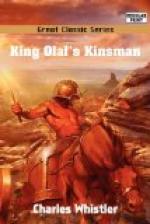Then the thrall leapt up and yelled, and fled into the dark wood. And that was enough for the Danes. They gave not another thought to us, but cried out in mortal terror and fled also, tripping and crashing through the underwood as they went; while the song of the White Lady grew louder, and she still neared us.
Then, still singing, her pace quickened, and suddenly I saw that she came in no magic wise, but in the fisher’s canoe which I had seen. And then the bows touched the shore, while with a wholesome clank of sword, and throwing back his long white cloak, Ottar the scald leapt ashore and came to us, dagger in hand, and cut our bonds.
“Into the boat, lord king—quick!” he said. “We shall be safe there.”
Dazed and stiff I was, but I rose and followed Olaf; then Ottar pushed off, and we shot out towards the midst of the mere into safety.
Then the king stared at me and at Ottar for a moment in amazement, and then laughed until the woods rang again, and I and the scald were fain to join him. Never had I heard such sounds before in that haunted place.
“Now, Ottar,” he said, when he could speak again, “never say more that you fear troll, or nix, or ghost—for you have done what you told me but half an hour ago was most unwise.”
“I needs must do somewhat, lord king,” said Ottar gravely, “and it came into my mind that these Danes would be as badly scared as should I have been had I met Gunnhild; and methought that Redwald’s lady would forgive me for his sake.”
“Aye, surely,” I said.
Then—was it fancy, or a vision wrought on me by long looking at Ottar as he came across the red track of the firelight on the water, still dimpled by the boat, glided the white form of no earthly maiden, and was gone.
I saw it and said nought. Ottar sat in the stern facing us, and his eyes were away from the fire, and Olaf was beside me, and I thought that he started.
Then Ottar said:
“Can we go back by water, Redwald? It would be safer.”
I showed him the channel which leads to the river, and he took the paddle with which he had so deftly sculled the boat across the mere, and as we left the overhanging trees and saw the faint glow of the rising moon across the open river we breathed more freely, and were safe.
Surely had it not been for the scald’s ready wit both Olaf and I had been lying even now in the dark mere. For it would have been death to us all three had Ottar tried to rescue us sword in hand. It is his saying that he was so frozen with fear at first—until he knew we had met with mortals only—that he stood still and helpless, listening. Then came to him the thought of what to do, when he heard the talk of either ransom or drowning and knew that we were not slain. So even as Olaf had bidden him in jest, he had turned his cloak and had saved us.
But Ottar the scald’s courage and craft are well known, and I have other thoughts concerning his fear. But I know this, that never again could he find that strange and sweet voice that had come to him in the need of his master.




